Justice Isa’s wife questions FBR assessment of her wealth
Sarina Isa says her agricultural income is sufficient to justify purchase of three properties in UK

Sarina Isa – wife of Supreme Court judge Qazi Faez Isa – has disputed the Federal Board of Revenue’s (FBR) assessment about her income as well as the value of her foreign properties.
"You finally accept that I was a working woman but then qualify it by saying that I only had taxed source only to the tune of Rs9,375,931. You have also determined the purchase of three properties at Rs104,680,020.
“I do not know where you have taken the figure of Rs93,75931 from as you do not provide the details nor [tell] how you have determined the amount of Rs104,680,020. Please do so now," Sarina said in her written reply to the FRB’s fourth notice issued on August 21.
A 10-judge bench of the Supreme Court on June 19 quashed a presidential reference which claimed that Justice Isa – who is in line to become the chief justice of Pakistan – had committed misconduct by not disclosing his family member’s foreign properties in his wealth statement.
In the split order, the bench had, however, asked the FBR to launch an inquiry into the foreign properties of the judge’s family members and to submit its report to the Supreme Judicial Council (SJC) – the constitutional forum that can hold a superior court judge accountable.
Responding to the FBR’s notice, Sarina Isa once again requested it to provide the documents which were relied on in assessment. Likewise, she also sought a copy of all her returns. Sarina said she had started to work in Karachi American School 38 years ago – before her marriage – and worked there for decades.
“I do not know from which date you started [reckoning] my earning. Is it the date from which I started working at the school or when I started to submit my own returns?
“I also do not know whether you added the non-taxable part of my earnings in my earnings. Please answer my questions and provide copies of tax filing of the school and copies of all my returns."
Sarina said she along with a friend bought an office in the Clifton area of Karachi which was later rented. However, income tax is not payable on a certain percentage of amount from the rent. She asked the FBR as to whether it examined this aspect.
Sarina said she later sold that office at a profit. "Have you taken the sale consideration into account and treated it as part of my savings?" she asked.
She said she also purchased a house at Clifton which was also rented out. The rent income was disclosed and tax also paid after permissible deductions. She asked as to whether certain percentages of deductions were considered as her earnings.
She stated that she also sold out that house later at profit and there was no requirement of paying on capital gains. Have you taken sale into account, she asked.
Sarina also revealed that she owned 278 acres of land – which is equal to 2,243kanals.
This land was managed by her father who died on June 25 this year. However due to shortage of time, she could not give the exact amount which she earned from agricultural land.
She said the amount of agricultural income would easily cover the price of the three properties prior to dates that they were bought. Once I visit Jacobabad and Nasirabad then I will be able to provide you information about earning from these lands, she added.
Sarina stated that she invested income from the agricultural land in saving certificates issued by the government of Pakistan. Some of the agricultural income was deposited in a rupees account in UBL.
She said her agricultural income is sufficient to justify purchase of three properties in the UK.
"The price of the UK pounds and the USA dollars was less than they were bought. I do not accept as alleged by you that the price of properties was Rs104,680,020. Where have you taken the figure from?"
Sarina Isa also referred to section 174 (3) of the Income Ordinance which stipulates that an individual is not required to maintain records for more than six years.
“Despite said the statutory requirement, you have not explained as to how you keep seeking records from me which are older than six years,” she questioned.
Sarina also referred to Section 122 (2) which says that tax matters get finality after five years, adding that the first property was purchased in 2004 and two other properties were purchased in 2013. She wondered how the FBR is acting contrary to the five-year limitation.
She asked why the FBR disregarded her agricultural income and treated it as an unexplained income.
The judge’s wife also referred to Section 41 which says the agricultural income would be exempted from tax under the ordinance. She also referred to Section 4 of the Protection of Economic Reforms Act 1992 which states that a foreign account holder enjoys immunity against inquiry of the income tax department.
Sarina said her money trail is available as funds were transferred through banking channels. “However, you could not ask any query about my foreign accounts.”
She also alleged that the FBR illegally collected information about her foreign currency accounts. She also rejected that she changed her stance regarding purchase of these properties.



















COMMENTS
Comments are moderated and generally will be posted if they are on-topic and not abusive.
For more information, please see our Comments FAQ